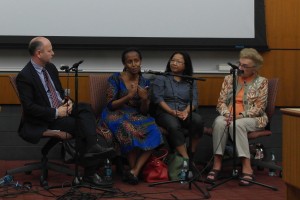USC hosts female genocide survivors panel
Tuesday night, the Shoah Foundation Institute Student Association hosted “Women of the Holocaust, Cambodia, and Rwanda: Three Survivors in Conversation,” a panel featuring three women who had survived genocide in different parts of the world during the 20th century.

Survivors · (Left to right): USC Shoah Foundation Executive Director Stephen Smith, Rwandan Genocide survivor Edith Umugiraneza, Cambodian Genocide survivor Sara Pol-Lim and Holocaust survivor Celina Biniaz spoke during Tuesday evening’s event. – Christine Yoo | Daily Trojan
This event concludes USC’s Genocide Awareness Month, which strives to bring events to the community to recollect and raise awareness about genocide, mass atrocities and preventative action that can be taken.
The panel was moderated by USC Shoah Foundation Executive Director Stephen D. Smith, who also holds the Inaugural UNESCO Chair in genocide education. He is also the founder of the UK Holocaust center.
The panelists included Holocaust survivor Celina Biniaz, who is the youngest female Jewish factory worker protected by Oskar Schindler. She began speaking of her experiences in the Holocaust following Steven Spielberg’s film Schindler’s List. Biniaz referred to Spielberg as her “second Schindler” for providing her with freedom to share her story.
Also on the panel was Sara Pol-Lim, who is a survivor of Khmer Rouge’s killing fields, a genocide in Cambodia enacted by the Communist regime estimated to have had one to eight million casualties. Pol-Lim lost her father, three brothers, and many other close relatives.
The third panelist was Rwandan Genocide survivor Edith Umugiraneza, who is the youngest in a family of seven children and lost most of her family during the genocide, including her mother and some of her siblings.
The panel spoke of what remembrance meant to them as genocide survivors.
“I’m 82 years old, so I think it’s very important for me to let other people know, particularly young people, that it’s important to fight bigotry, to accept people for what they are, and value each human being,” Biniaz said. “Hatred is extremely corrosive, only to the person who hates and not so much to those they’re hating because they don’t feel it.”
Pol-Lim stressed that immersing herself with others in her similar situation was what helped her recover from her past.
“I have the opportunity to share with the entire Long Beach Cambodian community, and we came together to inspire hope and in the process heal ourselves,” Pol-Lim said. “For us, there’s no closure. The only closure we have for ourselves is that forgiveness. We have to find that; for me, it’s working in the community. The best way in healing yourself is to help others. It gives me a hope and incentive to appreciate my family.”
Umugiraneza agreed with Pol-Lim, as both women are strong proponents in their communities for remembering and learning from their respective genocides.
“For me, remembrance means prevention, because if we don’t remember we don’t prevent; people will not know what happened,” Umugiraneza said. “It’s educating that will help me honor my people. For me if I stand up and talk about what happened it’s my own way to honor my people.”
The panel also focused on how during genocide, women became more frequent targets of sexual abuse. Umugiraneza remembers her mother telling her to leave their home because as a young girl, she was more vulnerable to being attacked. Biniaz agreed, saying that in Poland most female children didn’t survive, and she was liberated only because of Schindler needing children with small hands.
The women also agreed that they were where they were today due to having a strong mother. The hope that helped them escape their confines came from the wise words of their mothers. Biniaz in particular recalled her mother’s most frequent words.
“The world owes you nothing,” she said. “You take what is given to you and move forward.”
Pol-Lim said her mother instilled the courage into her that led her to fight against oppression rather than give in. She recounted a story where she and her mother were in a line to be executed. All the women were crying and one who stood next to Pol-Lim’s mother asked why the pair wasn’t crying.
“It’s okay — at least I know my whole family will be together,” Pol-Lim’s mother said.
As Pol-Lim heard that, the line was broken and she and her mother were spared from being shot.
Lastly, all three women stressed the importance of forgiving.
“You cannot move forward unless you educate people so that it doesn’t happen again, Biniaz said. “But if you can’t find a peace within yourself, which is forgiveness, then you’re always stuck in a trap because you’re always going to feel resentful.”
Editor’s note: This post has been updated.

